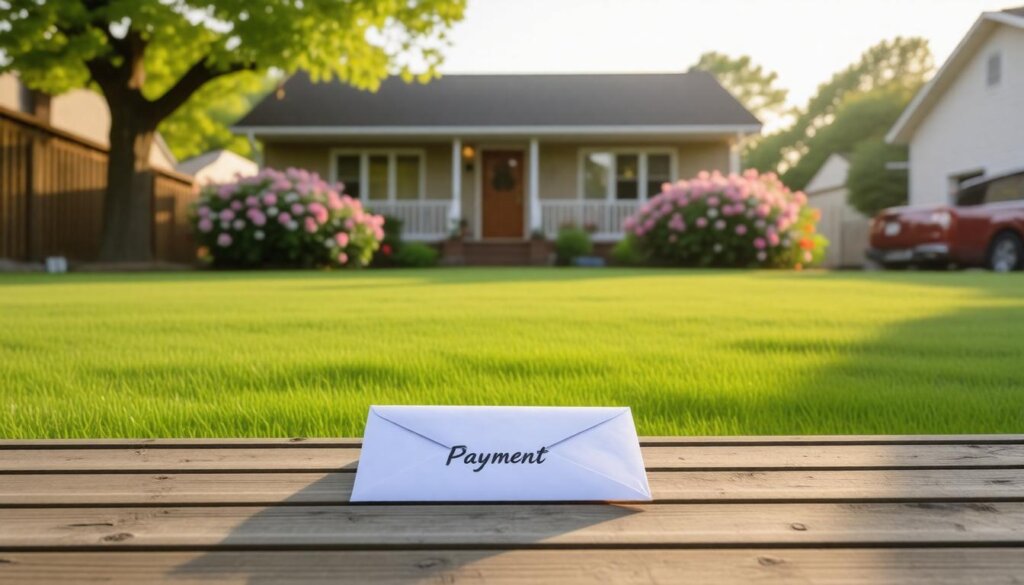How to Stop Foreclosure- Facing foreclosure can be a terrifying experience, leaving homeowners feeling trapped and unsure of what to do next. If you find yourself in this situation, you’re not alone. Many individuals grapple with the reality of missed payments and the looming threat of losing their homes. Understanding that there are options available is the first step toward regaining control. One potential solution that might catch you off guard is making a lump sum payment to your lender. While it may sound daunting, this action could provide a much-needed lifeline to help you hold onto your home and start fresh. Let’s dive into how this works and explore the steps you can take to navigate through foreclosure successfully.
Yes, making a lump sum payment can potentially halt foreclosure proceedings by paying off the owed amount on your mortgage. However, it is crucial to contact your lender as soon as possible to discuss this option and ensure that you understand all implications and required steps.

Foreclosure Process Overview
How to Stop Foreclosure- Foreclosure represents a significant challenge for many homeowners, as it is a legal procedure initiated by lenders to reclaim the property when loan payments go unpaid. The journey usually starts quietly enough—most often after a borrower misses several monthly payments, typically falling behind by about three to six months. As the missed payments accumulate, the lender intervenes. Initially, a notice of default will be dispatched to the homeowner, providing an opportunity to catch up on overdue payments and avoid further action.
If this notice is overlooked or ignored, things get serious. The next step involves sending a notice of sale, which officially heralds the scheduled auction of the property. This escalation can feel overwhelming; however, recognizing this series of events allows homeowners to feel more in control when seeking solutions.
Step-by-Step Breakdown
To prevent foreclosure effectively, it’s crucial to grasp the sequence of steps involved. After the initial notice of default, homeowners are generally afforded a certain period—often between 30 days to several months—to make overdue payments or negotiate alternatives with their lender. If these efforts do not yield results, the lender will set a date for an auction where the home may be sold to satisfy the outstanding loan balance.
Normally, this timeline isn’t rigid; it can be impacted by factors such as communication with your lender and ongoing negotiations. Homeowners should also understand that lenders prefer not to move forward with foreclosure if they see potential in recovering their funds through other means.
State-Specific Regulations
It’s equally important to recognize that foreclosure processes vary significantly from state to state. Local laws dictate everything from notification periods to auction procedures.
For instance, in Georgia, where Myers House Buyers primarily operates, the non-judicial foreclosure process can occur at an accelerated pace. Typically, once formal notice is given, homeowners have just 30 days before their property may be auctioned off at public sale. This brevity underscores why being informed about local regulations can empower homeowners in distress.
Familiarizing yourself with your state’s unique foreclosure laws clarifies your rights and opens avenues for effective action. Resources such as local housing counseling agencies or legal aid services can provide tailored advice specific to your situation.
Emotional Impact
The emotional impact of facing foreclosure cannot be overstated. Many families grapple with feelings of despair and anxiety upon receiving notices from their lenders. However, understanding the steps involved in this process can help diminish those feelings of helplessness and uncertainty.
Knowledge is empowering; by learning what lies ahead and the options available—such as negotiating payment plans or selling your home quickly—it brings a glimmer of hope amid challenging circumstances.
To navigate through foreclosure’s complexity and fear effectively, maintaining awareness of each stage encourages deliberate actions that may lead to viable solutions. Engaging real estate professionals like Myers House Buyers for quick cash offers can make all the difference in reclaiming control over your financial future.
With these insights in mind regarding foreclosure processes and emotional impacts, it’s essential to examine how particular strategies, like making a lump sum payment, may influence mortgage arrangements moving forward.
Impact of a Lump Sum Payment on Mortgages
Making a lump sum payment to your lender can be one of the most effective actions you can take to stop foreclosure in its tracks. This payment includes not just the overdue mortgage balance, but also any penalties and additional interest accrued. It’s almost like hitting the reset button on your mortgage situation.
When processed successfully, this immediate action reinstates your mortgage, effectively putting a stop to the foreclosure process right then and there.
According to a recent report by the Mortgage Bankers Association, approximately 25% of homeowners facing foreclosure managed to turn their situation around through such payments. That statistic illustrates just how impactful this approach can be!
Immediate Relief
The elation felt upon reassuring your home security cannot be overstated. Imagine pouring over countless sleepless nights worrying about losing your home and suddenly having that weight lifted off your shoulders with just one significant action. However, while the relief can be immediate, one must also consider what is required to muster such lump sum payments—a reality that many find quite daunting.
Challenges
Gathering the necessary funds for a lump sum can seem monumentally challenging. Picture yourself racing against time; not only must you acquire a large sum, but you also have to do it under pressures from late fees and potential legal costs that accumulate day by day. Each moment wasted compounds the problem and can leave many feeling overwhelmed.
It’s crucial to approach this challenge with both strategy and determination. Don’t let mounting fear paralyze you. Instead, focus on breaking down the process into manageable steps.
Potential Sources for Lump Sum Payments
So where can these funds come from? Often, homeowners explore various avenues—savings accumulated over years, borrowing from understanding family or friends, selling unused possessions, or even taking out personal loans. Each option carries its pros and cons which should be examined meticulously before proceeding.
Nonetheless, beyond simply raising funds, it’s also essential to engage proactively with your lender about your situation, as they might offer beneficial solutions that could ease the financial burden even further. Transitioning towards discussing tangible steps may lead to more favorable outcomes for your financial strategy.
Options for Negotiating with Your Lender

When facing the stress of potential foreclosure, it’s essential to remember that your mortgage lender may be more flexible than you expect. Instead of fearing a confrontation, approach the situation as an opportunity for dialogue. Understanding and exploring your options can help create pathways toward resolution. Many homeowners are surprised to learn that lenders often prefer working with them rather than going through the lengthy process of foreclosure, which can incur additional costs for all parties involved.
Reinstatement Plans
One significant option is a reinstatement plan. This means paying the total amount that you owe in one lump sum within a specific timeframe agreed upon with the lender. The idea here is quite straightforward—once the payment is made, your mortgage account returns to good standing and stops the foreclosure process immediately upon receipt.
Even if this sounds like a far-fetched plan at first glance, it can be achievable, especially if you anticipate a future influx of cash or have access to funds that allow you to clear the outstanding balance.
But sometimes reinstatement might not be feasible.
Loan Modification
In such cases, loan modification can be another beneficial route worth discussing with your lender. A loan modification alters the terms of your existing loan without changing the total amount owed. This may involve extending your repayment timeline, reducing your interest rate, or even creating new terms altogether. As a result, monthly payments become more manageable.
“Negotiating a loan modification saved my home,” shares Jane Doe, a homeowner we assisted. Her story emphasizes that negotiating with your lender could mean the difference between staying in your home and facing foreclosure.
If neither reinstatement nor loan modification fits your situation, there are still more options available.
Forbearance Agreement
Another option is establishing a forbearance agreement with your lender. This generally allows for a temporary reduction or complete suspension of payments for a set period, typically ranging from six months to a year. The beauty of forbearance lies in its flexibility; it gives you breathing room while you stabilize your financial situation. However, once the forbearance period concludes, you’ll need to either resume making regular payments or arrange a payment plan to cover any missed amounts during that time.
Navigating these options can be challenging without appropriate guidance.
Seeking legal advice further enhances your ability to effectively negotiate with your lender and understand your rights as a homeowner deeply. Armed with knowledge and strategy, it’s possible to explore solutions together that suit both parties’ needs—ultimately avoiding foreclosure and finding peace of mind in what can seem like turbulent times.
As you consider your next steps, understanding how professional advice can guide you through this process will prove invaluable.
Seeking Legal and Financial Advice

When facing the possibility of foreclosure, seeking professional guidance is vital not just for navigation but also for empowerment. It can feel overwhelming to understand your situation fully, but having knowledgeable professionals at your side can ease that burden. Think of legal counsel as your best ally in this challenging time; they bring deep insights into state-specific laws and can clarify what options are available to you. By consulting a foreclosure attorney, you gain a solid foundation for understanding your rights as a homeowner, which is essential in crafting an effective defense. They can point out irregularities in the process or help negotiate with lenders, potentially leading to more favorable outcomes.
Legal Counsel
In addition to providing legal representation, a foreclosure attorney will often be well-versed in local regulations. This knowledge is particularly important since foreclosure laws vary significantly from state to state. Understanding these nuances can quickly shift the outcome of your case. For instance, attorneys may spot potential violations by your lender such as failing to adhere to proper notification procedures. Identifying such technicalities can open doors to halting the foreclosure process while you explore other options.
Beyond legal expertise, financial advisors also play a pivotal role during this critical period.
Financial Advisors
Now, let’s shift the focus to finances. A financial advisor serves as another critical resource on your journey to preventing foreclosure. They provide assistance in critically reassessing your current budget and identifying areas where you might cut costs or redirect funds—perhaps even uncovering money designated for savings that could instead support a lump sum payment towards your mortgage arrears. This kind of proactive strategy is backed by data; according to a survey by the National Foundation for Credit Counseling, 70% of homeowners who sought financial advice successfully avoided foreclosure.
Working with an advisor can also involve creating smart budgeting strategies that fit your lifestyle while accommodating any immediate financial stressors. Your advisor may recommend prioritizing essential expenses and finding manageable ways to increase income through side jobs or temporary work arrangements while getting back on track.
Government Programs
Don’t forget about the resources available through government-sponsored programs designed specifically for struggling homeowners. For example, the Home Affordable Modification Program (HAMP) offers modifications that can reduce monthly payments and make them more affordable without compromising long-term stability. These programs can alleviate some pressure by restructuring your debt and making it more manageable over time.
In cases where lump sum payments seem unattainable due to various financial burdens, exploring these alternatives becomes even more critical. As we consider other viable options to support your financial situation, there are various paths available that might better suit your needs.
Other Payment Alternatives
One effective approach is establishing repayment plans with your lender. In this scenario, you and your lender work together to create a structured plan where you can pay back overdue amounts over several months, making it easier to manage financially without overwhelming strain. This means that instead of facing a mountain of debt all at once, you tackle it bit by bit.
For example, if you’re behind on $2,000, your lender might allow you to add an extra $200 each month to your usual payments until you’ve cleared the debt. It’s an arrangement that provides warmth and reassurance in what can seem like a cold and daunting situation.
Moving beyond repayment plans, consider a short sale as another alternative.
A short sale occurs when you sell your property for less than the amount owed on your mortgage. While this option does require approval from your lender before proceeding, it could be a lifeline for homeowners facing foreclosure. If executed properly, the proceeds from the sale can settle the outstanding debt.
However, it’s important to keep in mind that while a short sale may prevent immediate foreclosure, it can still impact your credit score negatively. The key takeaway here is that while you’re alleviating financial pressure in the short term, long-term consequences exist.
In addition to a short sale, homeowners might explore a deed in lieu of foreclosure.
This option allows you to voluntarily transfer the title of your property back to the lender, essentially clearing the outstanding debt without involving foreclosure auction processes. It can lessen some of the chaos that comes with foreclosure; however, like the other alternatives, it also carries its own set of implications for your credit rating. By opting for this route, you’re not only giving up your home but also entering territory where rebuilding could be necessary afterward.
Each of these alternatives presents unique advantages and challenges in navigating financial difficulties related to housing. Understanding the nuances of each option can empower homeowners to make informed decisions that reflect their personal circumstances and goals.
With these options laid out, let’s now consider how one might formulate a viable strategy to manage repayments effectively moving forward.
Developing a Repayment Plan
Structuring a workable repayment plan not only safeguards your home but also enables you to manage your finances thoughtfully. Imagine sitting at your kitchen table, surrounded by bills and paperwork, feeling overwhelmed. By developing a clear repayment strategy, you can transform that chaos into clarity. The first step in this process is creating a budget that accurately reflects your current financial situation.
Creating a Budget
Begin by taking stock of all your sources of income and essential expenses. This means jotting down not just your salary but also any side jobs or rental income you may have. Next, identify those unavoidable expenses: housing payments, utilities, groceries, and transportation costs. By understanding where every dollar goes, you can pinpoint how much money you have available to allocate towards your repayment plan.
A practical exercise here is using a simple spreadsheet or budgeting app to visualize these figures. By tracking your spending for a month, you might even discover areas where you can cut back, providing you with extra funds to address your outstanding mortgage balance.
Once you’ve developed a budget, the next step is proposing a plan to your lender, which can feel intimidating but is crucial.
Proposing a Plan to Your Lender
Approach your lender with a realistic repayment plan that reflects what you’ve discovered in your budget. For instance, if you owe $5,000 and realize you can contribute an extra $200 per month on top of your normal mortgage payment, present this offer thoughtfully. Be prepared to explain how this new payment structure helps maintain both your financial stability and commitment to repaying the debt.
It’s important to remember that lenders often prefer facilitating loan modifications over dealing with foreclosures. Thus, presenting them with an actionable plan can open doors for negotiation and keep communication lines open.
Now that you’ve proposed your plan, staying committed to timely payments becomes vital in ensuring its success.
Commitment to Timely Payments
Maintaining prompt payments under the new arrangement helps prevent future foreclosure risks. According to Federal Housing Finance Agency data, about 40% of homeowners who follow structured repayment plans successfully retain their homes. This statistic illustrates the importance of consistency; falling behind even once can significantly diminish those odds.
Consider setting up reminders on your calendar or automatic transfers from your bank account to ensure payments are made on time each month. Establishing these habits will not only help ease financial stress but also improve your relationship with the lender as they see you meeting your commitments diligently.
If you’re feeling overwhelmed at any stage of this process, remember that professional guidance is available.
Leveraging Professional Help
If negotiating directly with your lender feels daunting or if you’re uncertain about how best to communicate the details of your repayment plan, consider leveraging professional help from a financial counselor or lawyer. These professionals bring valuable expertise that can make negotiations smoother and more effective.
They can assess your individual circmstances and provide tailored advice on how best to frame your repayment proposal while offering support along the way. Having someone by your side can be reassuring as you navigate these challenging waters.
Engaging with professionals ensures you’re making informed decisions and enhances the likelihood of reaching agreements favorable for both yourself and the lender.
Taking control of the repayment process contributes significantly toward keeping your home while effectively managing financial challenges. If you’re facing foreclosure concerns or need assistance, reach out to us at Myers House Buyers or call (706) 607-5251 to explore options tailored for you.

